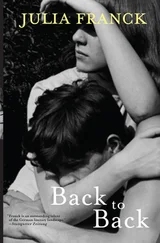‘I see.’
Tatyana took a sip of juice and wiped her mouth with a paper napkin. ‘I told her that if we lived together we had to respect each other.’
‘Right.’
‘She asked me to move out.’
I set my fork down too. ‘In what sense?’
‘She said she wants me to leave the apartment immediately. The contract is under her name. I was just paying her my share.’
‘But she can’t kick you out like that.’
‘If she had a boyfriend,’ Tatyana said, ‘that would be fine by me. But they are all different guys, you know, foreigners or older guys. I no longer feel comfortable at home.’
Tatyana was now staring down at her plate, avoiding my eyes, her blonde curls dangling over her food.
‘I’m sure you can sort out things with Katya,’ I said. ‘You are old friends.’ Then, pointing at my empty plate, ‘Are there any more?’
‘Of course.’ Tatyana stood up, took my plate and served me two more cabbage parcels. ‘Katya has changed since she came to Moscow,’ she said. ‘All she thinks about now is going out to clubs and meeting men. She’s not the same.’
‘Moscow changes people.’
‘Why does everything have to be so hard in Moscow?’ Tatyana’s eyes were moist.
I poured some juice into her glass.
‘People are so mean here,’ she went on. ‘Back in Siberia people are nice to each other, friendly. Here in Moscow, everybody pushes you in the metro, in the street, nobody cares about anybody.’
I forked a piece of cabbage roll. ‘Moscow’s a jungle.’
‘Martin, you know I cannot afford to rent my own apartment. A friend at work said I could stay with her for a couple of weeks until I find something. But she lives with her family and has two small children.’
I stood up, opened the fridge and grabbed a bottle of beer. ‘Are you sure you can’t sort out things with Katya? Friendships go through rough patches. I’m sure you can both find a way to go on living together.’
‘Martin, I don’t want to live with her any more.’
I stood leaning on the kitchen bench, took a sip of beer. One cabbage roll remained on my plate.
‘I know this is a lot to ask,’ Tatyana said, now almost crying, ‘but would you mind if I moved in here for a few days a week while I looked for a permanent place to stay?’
‘What do you mean a few days a week?’
‘I don’t want to be a burden,’ Tatyana said. ‘I know you enjoy being alone, to read your books and go out with your friends. I thought maybe I could just stay here from Monday to Friday, so that I can go to work. It’s so convenient from here, only two metro stops. On Fridays I could take the elektrichka after work and spend the weekend at my aunt’s.’
‘Have you told your aunt about this?’
‘Yes. She offered to let me stay with her all the time but, you know, her place is two hours away from Moscow. I can’t spend four hours on the train every day.’
‘I see.’
‘I don’t want to interfere with your life and your friends. This is just for a few weeks until I find something more permanent.’
Her lips were trembling. An unexpected warm feeling climbed up from my stomach. I kissed her on the cheek. Tatyana burst into tears.
Suddenly I hated Katya, whom I’d never met, for bringing guys home and hurting Tatyana.
I held Tatyana in my arms. She was breathing heavily. For a few seconds I wanted to tell her, don’t worry, you can stay with me as long as you want, also during weekends. Let’s live together. Let’s give it a serious try. But those were not the words that came out of my mouth.
‘A few days a week would be fine,’ I said. ‘You can stay here from Monday to Friday. No problem.’
Tatyana breathed deeply and I realised how difficult it had been for her to ask. She kissed me, took hold of my face and looked straight into my eyes. ‘Are you sure? Martin, I really don’t want you to do it if you don’t feel good about it. I know we have only known each other for a little while.’
The green of her moist eyes was almost transparent.
‘Stop crying,’ I said, wiping her cheeks with my fingers. ‘Moscow doesn’t believe in tears.’
She smiled. ‘Martin, I adore you.’
‘We can move your stuff here on Sunday.’
‘You know I can’t afford to pay half the rent you pay, but I can help with a bit and also with the groceries.’
‘Don’t worry about that.’
I finished the cabbage. Tatyana made tea and we moved to the living room to watch a movie. She fell asleep before the end.
Next morning, after Tatyana had left for work, I opened the balcony door and stepped outside with a cup of coffee. It was sunny, the roofs of Moscow gleaming under a clear sky. I took a deep breath, the warmth of the air taking me by surprise. Summer had arrived.
Sipping my coffee, listening to the clamour of the city, I looked forward to the warm days — going out with the brothers, nights on the restaurant terraces, the party boat — but also, I now realised, to Sunday evenings, to having Tatyana back at home. As far as I could see, I was looking forward to every single day that was coming to me. Standing on the balcony, I felt lightness in my heart, a sense of plenitude. And for a few minutes, gazing at the urban horizon, contemplating the arrival of summer in Moscow, I believed in happiness.
IN NEST OF THE GENTRY , Turgenev nails the quintessential Tatyana esque heroine. Liza is young, naive, pure-hearted. She lives with her mother and aunt in a provincial city, enjoying the simple life of the Russian gentry, which involves, Ivan Sergeyevich tells us, a lot of piano-playing, tea-drinking, book-reading, church-going. She’s particularly pious, Liza, raised under the influence of her Russian peasant nanny.
Liza finds herself with two suitors. Panshin is a young officer: handsome, entertaining, respectful, charmant. Even if somehow superficial, Panshin possesses plenty of social and artistic skills, and a promising career ahead of him. By any standards, a good catch. To top this off, Panshin enjoys the full approval of Liza’s mother.
Liza’s other suitor, Lavretsky, is an older landowner: thoughtful, melancholic, married.
Lavretsky, the protagonist of the book, had been living in Paris with his wife, Varvara Pavlovna, and has just returned to Russia on his own after discovering that she had been cheating on him with a Frenchman. In sharp contrast to the very Russian Liza, Ivan Sergeyevich depicts Varvara Pav lovna as a flirtatious socialite, a man-eater, a femme fatale who is shamelessly Europeanised.
Back at home, Lavretsky rediscovers the beauty of the Russian countryside and its people. He starts to work on his neglected properties, making plans to provide for his peasants. As he adapts to his new surroundings, he’s impressed by Liza’s pure heart. He regrets that her goodness and beauty are to be lost to the superficial Panshin, whom he sees as a charlatan, undeserving of Liza. Gradually, Lavretsky, still hurt from his Paris debacle, develops feelings for Liza. Perhaps, he thinks, he could enjoy a second chance to renew his faith in love. The problem is that, as a married man, he’s not in a position to act upon his romantic interest. This is the case until one fine day, flipping through the newspapers he receives from Paris, Lavretsky reads with astonishment that his estranged wife has died. He is now a free man.
Lavretsky tells Liza about the death of his wife and makes his own feelings clear. Meanwhile, Panshin proposes to Liza and she asks for time to think about it.
Now, Liza has a choice.
Russian as she is, Liza finds herself attracted not to the young charming officer, but to the older melancholic widower. Her decision is made on the spur of the moment, when, during a furtive night-time encounter, she lets Lavretsky steal a kiss. This being nineteenth-century Russia, the kiss kind of seals their mutual intentions.
Читать дальше












